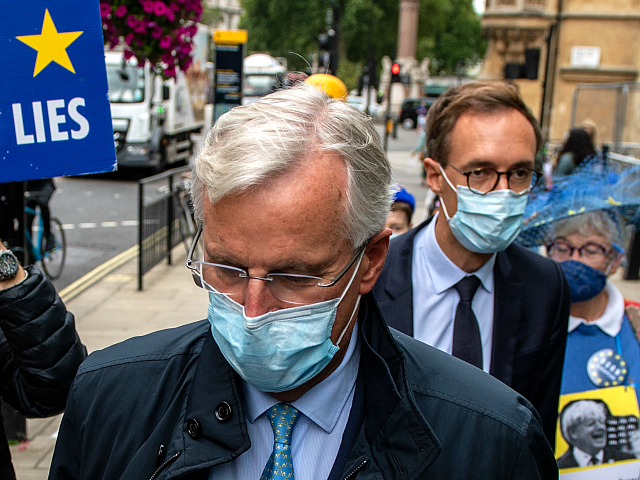Britain’s Brexit negotiator has called out EU negotiator Michel Barnier for the bloc’s apparent dirty tricks on Northern Ireland, which could see the British province of Northern Ireland blocked from importing food from Great Britain.
The United Kingdom technically left the EU in January, but for now remains locked in a so-called “transition” period in which EU control over British fisheries, the EU’s Free Movement migration regime, and the supremacy of EU law and EU judges remain in place while negotiations for a new deal on trade, security, and so on are conducted.
If one cannot be struck, as looks increasingly likely, as the EU insists on continued control over British fisheries, British submission to EU business and state aid regulations to achieve a “level playing field”, and more as the price of a trade agreement, Britain and the EU would revert to standard World Trade Organization (WTO) terms — were it not for special provisions on Northern Ireland.
Northern Ireland is an integral part of the United Kingdom of Great Britain and Northern Ireland — as the name would suggest — but has a special relationship with the Republic of Ireland, an EU member-state with which it retains an open border.
In the Withdrawal Agreement (WA) which Boris Johnson struck with the EU in October 2019, under pressure from a then-Remainer dominated House of Commons, it was agreed that Northern Ireland would continue to abide by EU market and state aid regulations in order to maintain that open border — upsetting British unionists in the province.
This contentious issue has now festered, however, with the British government putting forward a new Internal Market Bill which will allow British ministers to disapply elements of the Withdrawal Agreement if the EU tries to exploit it to disrupt trade between Northern Ireland and Great Britain, particularly with respect to foodstuffs, and to apply EU state aid law not just to Northern Ireland businesses but to businesses on the British mainland which have commercial interests there.
The EU has complained that this would break international law — heedless of the fact that senior British politicians such as Daniel Hannan believe that the imposition of trade barriers between Northern Ireland and the rest of the United Kingdom would break legally superior national law — with EU chief negotiator Michel Barnier denying a particular British accusation that it is threatening to use the Withdrawal Agreement to block the importation of food to the province from the British mainland.
This has prompted Barnier’s British counterpart, Sir David Frost, to spell out firmly and publicly exactly what the EU negotiating team is up to, and why it is necessary to legally pass legislation depriving the bloc of the power to effectively cut off one part of the United Kingdom from importing food from another part of the United Kingdom.
“On third country listings: the EU knows perfectly well all the details of our food standards rules because we are operating EU rules. The situation on 1.1.21 is accordingly perfectly clear. We have discussed this frequently with the EU including last week,” he explained.
“Any changes in future would be notified to the WTO and EU in the usual way with plenty of lead time. The EU lists dozens of countries globally on precisely this basis, without any sort of commitment about the future,” he continued.
“Yet it has been made clear to us in the current talks that there is no guarantee of listing us. I am afraid it has also been said to us explicitly in these talks that if we are not listed we will not be able to move food to Northern Ireland.”
“The EU’s position is that listing is needed for Great Britain only, not Northern Ireland. So if GB were not listed, it would be automatically illegal for NI to import food products from GB,” Sir David confirmed.
In other words, the EU appears to be declining to list the United Kingdom as a third country from which food can be imported, despite the fact it meets all the EU’s standards in this area — presumably so that it can keep the threat of a Northern Ireland “blockade” on the table as leverage in the negotiations.
Sir David suggests that this is why “the Govt needs powers in reserve” to disapply the WA if the EU attempts to use it in this manner — regardless of EU loyalists’ claims that this would somehow undermine Britain’s international standing and “the rule of law”.
In any event, Brexiteers supportive of the moves to give British government ministers new powers over how the WA is implemented say that the EU is itself breaking international law by failing to act in good faith, as its text requires, thus justifying corrective British measures — an argument EU loyalists and activist lawyers seem unwilling to consider.
Follow Jack Montgomery on Twitter: @JackBMontgomery
Follow Breitbart London on Facebook: Breitbart London

COMMENTS
Please let us know if you're having issues with commenting.